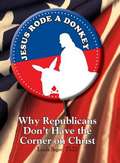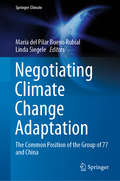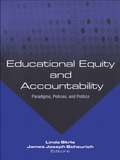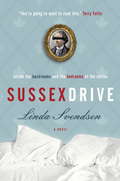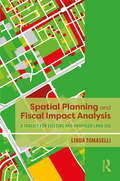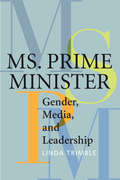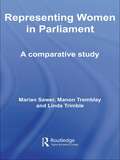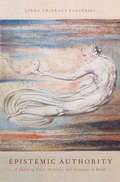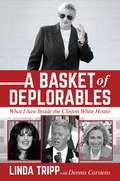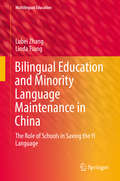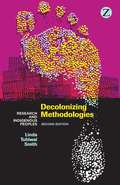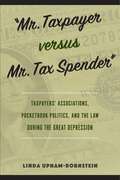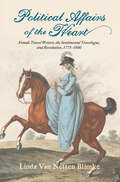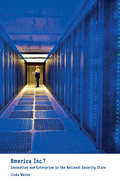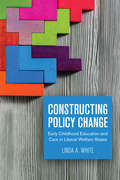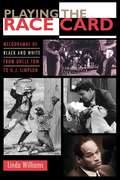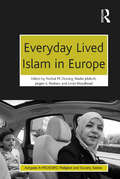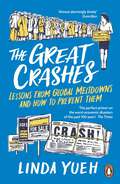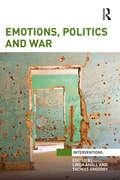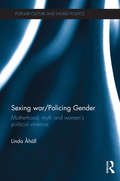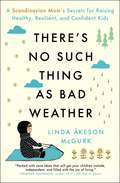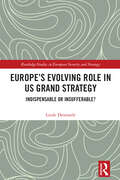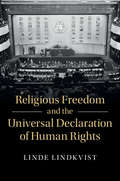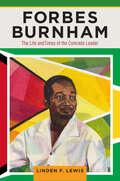- Table View
- List View
Jesus Rode a Donkey
by Linda SegerThe idea that America's real Christians are all Republican is just that--an idea, and an indefensible, divisive one at that. In its examination of current political affairs, this book exposes the many ways in which core Christian values ultimately correspond with basic Democratic ideology.
Negotiating Climate Change Adaptation: The Common Position of the Group of 77 and China (Springer Climate)
by María del Pilar Bueno Rubial Linda SiegeleThis book discusses the history of the Group of 77 and China’s negotiating position on adaptation to climate change in the context of the United Nations Framework Convention on Climate Change (UNFCCC). It also addresses a number of questions that have arisen, such as: What was the process for constructing a collective position of the G77 and China on adaptation? Why is it worthwhile to negotiate in a group of such dimensions? What are the incentives for reaching the broadest common position on adaptation? What is the role of the leading coordinators, and how is this linked to the rotating annual Presidency of the G77 and China? And, how do the subgroups of the G77 participate in reaching this general position? Written by former and current adaptation negotiators from developing countries, the book offers various perspectives from the subgroups and leading coordinators of the G77 and China as well as other organizations. Furthermore, in contrast to previous analyses on climate change negotiations, which focus mainly on the behaviour or position of one group, it presents a unique approach based on the strength of collectivism in the G77 and China. The book appeals to practitioners and professionals as well as scientists in climate change management and policy, impacts and adaptation, international relations, as well as diplomacy and development.
Educational Equity and Accountability: Paradigms, Policies, and Politics (Studies in Education/Politics)
by Linda Skrla James Joseph ScheurichDespite the intense political attention that has been focused on accountability, on standardized testing, and on the equity effects of both accountability and testing, the great majority of recent debate in education policy circles has failed to attend to either the dynamism or complexity of these issues and has, instead, been carried out in a dualistic, good versus evil, fashion. In contrast, the scholarship collected in this important new volume is designed to move beyond the prevailing dualism and to push the discourse about accountability, testing, and educational equity in public schools usefully forward, and to provide a much-needed resource for researchers, policy makers, and practitioners.
Sussex Drive
by Linda SvendsenA startlingly funny and deeply satisfying satirical novel that makes the Canadian political scene accessible, from the female perspective, behind the scenes at the top of the Hill. Torn from the headlines, Sussex Drive is a rollicking, cheeky, alternate history of big-ticket political items in Canada told from the perspectives of Becky Leggatt (the sublimely capable and manipulative wife of a hard-right Conservative prime minister) and just a wink away at Rideau Hall, Lise Lavoie (the wildly exotic and unlikely immigrant Governor General)--two wives and mothers living their private lives in public. Set in recent history, when the biggest House on their turf is shuttered not once, not twice, but three times, Becky and Lise--two of the country's most strategic feminine assets and tactical feuding neighbours--engage in a fight to the death in a battle that involves Canada's relationship to the United States, Afghanistan and Africa. The rest of the time, the women are driving their kids.From Linda Svendsen's sharp and wicked imagination comes a distaff Ottawa like no other ever created by a Canadian writer, of women manoeuvring in a political world gone more than a little mad, hosting world leaders, dealing with the challenges of minority government, and worrying about teen pregnancies and their own marriages. As they juggle these competing interests, Becky and Lise are forced to question what they thought were their politics, and make difficult choices about their families and their futures--federal and otherwise.
Spatial Planning and Fiscal Impact Analysis: A Toolkit for Existing and Proposed Land Use
by Linda TomaselliThe Spatial Fiscal Impact Analysis Method is an innovative approach to measure fiscal impact and project the future costs of a proposed development, recognizing that all revenues and expenditures are spatially related. The Spatial Method focuses on estimating existing fiscal impacts of detailed land use categories by their location. It takes advantage of readily available data that reflect the flows of revenues and expenditures in a city, using the tools of Geographic Information Systems (GIS). The result is a comprehensive yet transparent database for measuring existing fiscal impacts and projecting the impacts of future development or redevelopment. This book will provide readers with guidance as to how to conduct the Spatial Method in their own cities. The book will provide an overview of the history of fiscal analysis, and demonstrate the advantages of the Spatial Method to other methods, taking the reader step by step through the process, from analyzing city financial reports, determining and developing the factors that are needed to model the flows of revenues and expenditures, and then estimating fiscal impact at the parcel level. The result is a summary of detailed land use categories and neighborhoods that will be invaluable to city planners and public administration officials everywhere.
Ms. Prime Minister: Gender, Media, and Leadership
by Linda TrimbleMs. Prime Minister offers both solace and words of caution for women politicians. After closely analyzing the media coverage of former Canadian Prime Minister Kim Campbell; two former Prime Ministers of New Zealand, Jenny Shipley and Helen Clark; and Australia’s 27th Prime Minister, Julia Gillard, Linda Trimble concludes that reporting both reinforces and contests unfair gender norms. News about female leaders gives undue attention to their gender identities, bodies and family lives. Yet equivalent men are also treated to evaluations of their gendered personas. And, as Trimble finds, some media accounts expose sexism and authenticate women's performances of leadership. Ms. Prime Minister provides important insight into the news frameworks that work to deny or confer political legitimacy. It concludes with advice designed to inform the gender strategies of women who aspire to political leadership roles and the reporting techniques of the journalists who cover them.
Representing Women in Parliament: A Comparative Study (Routledge Research in Comparative Politics #Vol. 14)
by Manon Tremblay Marian Sawer Linda TrimbleThe first book-length treatment of the political representation of women in countries with parliamentary systems based on the Westminster model. Written by a major international team of authors, this new study features twelve chapters on both new and established parliaments, including Australia, Canada, New Zealand and the United Kingdom. It tests the latest theories about women's political representation within Westminster style assemblies and is organized into three key sections that: examine the extent to which the descriptive representation of women in the ‘old’ Westminster parliaments has progressed in recent years, and the factors which have enhanced or impeded development. explore the relationship between the numbers of women elected and the substantive representation of women – or the extent that women ‘act for’ women. review the recent experiences of four ‘new’ Westminster parliaments (Northern Ireland, Scotland, Wales and Nunavut) and evaluate the political opportunities for women provided by the creation of new institutions. This new comparative study will be of great interest to students and researchers of legislative studies and of gender politics and gender studies.
Epistemic Authority: A Theory of Trust, Authority, and Autonomy in Belief
by Linda Trinkaus ZagzebskiIn this book the author gives an extended argument that the self-reflective person is committed to belief on authority. Epistemic authority is compatible with autonomy, but epistemic self-reliance is incoherent.
A Basket of Deplorables: What I Saw Inside the Clinton White House
by Linda TrippA compelling insider&’s look at a political marriage that tore apart the nation and almost destroyed a presidency—from the woman who saw it all happen.In this brilliantly written behind-the-scenes account, Linda Tripp along with her co-author, Dennis Carstens, shares her side of the Clinton White House sex scandals for the first time—detailing the behavior of two very flawed people who fooled a nation: Bill Clinton, a sexual predator, and his wife, Hillary, who was his primary enabler. In this exposé, Tripp outlines what the public was not allowed to see: the lengths Clintons&’ protectors would go to lie, deceive, and coverup for them; some of the many women Bill Clinton used his position, privilege, and power as president to sexually abuse; how the former president got away with it thanks to his morally bankrupt, unscrupulous wife and cabal of protectors; and finally, the role party politics played when he was called to task and was almost the first president to be removed from office for perjury and corruption.
Bilingual Education and Minority Language Maintenance in China: The Role of Schools in Saving the Yi Language (Multilingual Education #31)
by Linda Tsung Lubei ZhangThis book looks closely at Yi bilingual education practice in the southwest of China from an educationalist’s perspective and, in doing so, provides an insight toward our understanding of minority language maintenance and bilingual education implementation in China. The book provides an overview on the Yi people since 1949, their history, society, culture, customs and languages. Adopting the theory of language ecology, data was collected among different Yi groups and case studies were focused on Yi bilingual schools. By looking into the application of the Chinese government’s multilingual language and education policy over the last 30 years with its underlying language ideology and practices the book reveals the de facto language policy by analyzing the language management at school level, the linguistic landscape around the Yi community, as well as the language attitude and cultural identities held by present Yi students, teachers and parents. The book is relevant for anyone looking to more deeply understand bilingual education and language maintenance in today’s global context.
Decolonizing Methodologies: Research and Indigenous Peoples (Second Edition)
by Linda Tuhiwai SmithA landmark in the process of decolonizing imperial Western knowledge.' Walter Mignolo, Duke University To the colonized, the term 'research' is conflated with European colonialism; the ways in which academic research has been implicated in the throes of imperialism remains a painful memory.
"Mr. Taxpayer versus Mr. Tax Spender": Taxpayers' Associations, Pocketbook Politics, and the Law during the Great Depression
by Linda Upham-BornsteinDuring the Great Depression, the proliferation of local taxpayers’ associations was dramatic and unprecedented. The justly concerned members of these organizations examined the operations of state, city, and county governments, then pressed local officials for operational and fiscal reforms. These associations aimed to reduce the cost of state and local governments to make operations more efficient and less expensive. “Mr. Taxpayer versus Mr. Tax Spender” presents a comprehensive overview of these grassroots taxpayers’ leagues beginning in the 1860s and shows how they evolved during their heyday in the 1930s. Linda Upham-Bornstein chronicles the ways these taxpayers associations organized as well as the tools they used—constructive economy, political efforts, tax strikes, and tax revolt through litigation—to achieve their objectives. Taxpayer activity was a direct consequence of—and a response to—the economic crisis of the Great Depression and the expansion of the size and scope of government. “Mr. Taxpayer versus Mr. Tax Spender” connects collective tax resistance in the 1930s to the populist tradition in American politics and to other broad impulses in American political and legal history.
Political Affairs of the Heart: Female Travel Writers, the Sentimental Travelogue, and Revolution, 1775-1800 (Transits: Literature, Thought & Culture 1650-1850)
by Linda Van BlimkeRichly researched and engagingly written, Political Affairs of the Heart traces the emergence of female sentimental travel writing in late eighteenth-century Britain, and posits its centrality to women’s engagement with national and gender politics. This study examines four travel narratives written by women between 1774 and 1795, convincingly arguing that they effectively deploy the discourse of sensibility to engage with debates around Britain’s national identity during the French and American Revolutions. Van Netten Blimke contends that Laurence Sterne’s A Sentimental Journey (1768)—which first introduced sentimental discourse to the travelogue—facilitated women’s gradual inclusion into this previously male-dominated genre, effectively paving the way for women to influence the country’s sociopolitical transformation. These four previously understudied works successfully combine eyewitness authority with the language of sensibility to mount impassioned interventions in their nation’s perception and practice of revolutionary politics, at a time when its national identity was most in flux.
America Inc.?: Innovation and Enterprise in the National Security State
by Linda WeissFor more than half a century, the United States has led the world in developing major technologies that drive the modern economy and underpin its prosperity. In America, Inc., Linda Weiss attributes the U.S. capacity for transformative innovation to the strength of its national security state, a complex of agencies, programs, and hybrid arrangements that has developed around the institution of permanent defense preparedness and the pursuit of technological supremacy. She examines how that complex emerged and how it has evolved in response to changing geopolitical threats and domestic political constraints, from the Cold War period to the post-9/11 era.Weiss focuses on state-funded venture capital funds, new forms of technology procurement by defense and security-related agencies, and innovation in robotics, nanotechnology, and renewable energy since the 1980s. Weiss argues that the national security state has been the crucible for breakthrough innovations, a catalyst for entrepreneurship and the formation of new firms, and a collaborative network coordinator for private-sector initiatives. Her book appraises persistent myths about the military-commercial relationship at the core of the National Security State. Weiss also discusses the implications for understanding U.S. capitalism, the American state, and the future of American primacy as financialized corporations curtail investment in manufacturing and innovation.
Constructing Policy Change: Early Childhood Education and Care in Liberal Welfare States
by Linda WhiteIn Constructing Policy Change, Linda A. White examines the expansion of early childhood education and care (ECEC) policies and programs in liberal welfare states, including Australia, Canada, New Zealand, the UK, and the USA. In the first part of the book, the author investigates the sources of policy ideas that triggered ECEC changes in various national contexts. This is followed by a close analysis of cross-national variation in the implementation of ECEC policy in Canada and the USA. White argues that the primary mechanisms for policy change are grounded in policy investment logics as well as cultural logics: that is, shifts in public sentiments and government beliefs about the value of ECEC policies and programs are rooted in both evidence-based arguments and in principled beliefs about the policy. A rich, nuanced examination of the reasons motivating ECEC policy expansion and adoption in different countries, Constructing Policy Change is a corrective to the comparative welfare state literature that focuses on political interest alone.
Playing the Race Card: Melodramas of Black and White from Uncle Tom to O. J. Simpson
by Linda WilliamsThe black man suffering at the hands of whites, the white woman sexually threatened by the black man. Both images have long been burned into the American conscience through popular entertainment, and today they exert a powerful and disturbing influence on Americans' understanding of race. So argues Linda Williams in this boldly inquisitive book, where she probes the bitterly divisive racial sentiments aroused by such recent events as O. J. Simpson's criminal trial. Williams, the author of Hard Core, explores how these images took root, beginning with melodramatic theater, where suffering characters acquire virtue through victimization. The racial sympathies and hostilities that surfaced during the trial of the police in the beating of Rodney King and in the O. J. Simpson murder trial are grounded in the melodramatic forms of Uncle Tom's Cabin and The Birth of a Nation. Williams finds that Stowe's beaten black man and Griffith's endangered white woman appear repeatedly throughout popular entertainment, promoting interracial understanding at one moment, interracial hate at another. The black and white racial melodrama has galvanized emotions and fueled the importance of new media forms, such as serious, "integrated" musicals of stage and film, including The Jazz Singer and Show Boat. It also helped create a major event out of the movie Gone With the Wind, while enabling television to assume new moral purpose with the broadcast of Roots. Williams demonstrates how such developments converged to make the televised race trial a form of national entertainment. When prosecutor Christopher Darden accused Simpson's defense team of "playing the race card," which ultimately trumped his own team's gender card, he feared that the jury's sympathy for a targeted black man would be at the expense of the abused white wife. The jury's verdict, Williams concludes, was determined not so much by facts as by the cultural forces of racial melodrama long in the making. Revealing melodrama to be a key element in American culture, Williams argues that the race images it has promoted are deeply ingrained in our minds and that there can be no honest discussion about race until Americans recognize this predicament.
Folter in Diktaturen und Demokratien: Eine Untersuchung von Funktions- und Wirkungsweise von Folter in politischen Systemen
by Linda WimmerDie vorliegende Arbeit analysiert die mögliche Funktions- und Wirkungsweise von Folter in politischen Systemen und geht vor dem Hintergrund des de facto Verbots der Folter im Völkerrecht der Frage nach, welchen Zweck die Folter im 21. Jahrhundert in Demokratien und Diktaturen eigentlich einnimmt. Die Autorin arbeitet die verschiedensten interdisziplinären Aspekte der Folter heraus. So wird die Gundlage für das theoretische Konstrukt eines Funktions- und Wirkungskataloges gebildet. Nach einem Überblick über die Folter im Laufe der Jahrhunderten und möglicher Sonderformen der Folter wird dieser Katalog anhand von sechs Länderbeispielen analysiert. Drei der Beispiele fallen dabei auf das demokratische Sprektrum der politischen Systeme wie die USA, Spanien und Israel. Die anderen drei nehmen Diktaturen des 21. Jahrhundert in den Fokus (China, Irak und Nigeria).
Everyday Lived Islam in Europe (AHRC/ESRC Religion and Society Series)
by Linda Woodhead Nathal M. Dessing Nadia JeldtoftThis book offers a new direction for the study of contemporary Islam by focusing on what being Muslim means in people’s everyday lives. It complements existing studies by focusing not on mosque-going, activist Muslims, but on how people live out their faith in schools, workplaces and homes, and in dealing with problems of health, wellbeing and relationships. As well as offering fresh empirical studies of everyday lived Islam, the book offers a new approach which calls for the study of ’official’ religion and everyday ’tactical’ religion in relation to one another. It discusses what this involves, the methods it requires, and how it relates to existing work in Islamic Studies.
The Great Crashes: Lessons from Global Meltdowns and How to Prevent Them
by Linda Yueh'A masterclass in spotting the early signs of a crisis' Nouriel Roubini'This is the historical perspective we need' John Kay'A first point of entry for anybody who wants to learn how the world sleep-walked into multiple crashes' Daron Acemoglu'Fascinating, well-written and authoritative' Tim Harford-----------------------------------------------------------------The global economy has weathered the most tumultuous century in modern financial history. Since America's Wall Street Crash of 1929, the global economy has weathered the most tumultuous century in financial history. From the currency crises of the 1980s, to Japan's housing meltdown, the dot com boom and bust, the global financial crash and the COVID pandemic, crash after crash has sent shockwaves through our world.The Great Crashes tells the stories of ten of these historic financial events. They serve as a series of cautionary tales, each with their own lessons to be learnt. With clear-eyed analysis, renowned economist Professor Linda Yueh uses these meltdowns to extract a critical three-step framework to help recognise the early signs of a crash, mitigate the effects and even prevent them in the future. There is very little that is certain in economics, except for this: there will be another financial crisis.Combining her in-depth knowledge with compelling storytelling, The Great Crashes is essential reading that offers urgent lessons for the modern world.-----------------------------------------------------------------'An important contribution that can help society anticipate and tackle potential crashes in the future' Christine Lagarde
Emotions, Politics and War (Interventions)
by Linda Åhäll Thomas GregoryA growing number of scholars have sought to re-centre emotions in our study of international politics, however an overarching book on how emotions matter to the study of politics and war is yet to be published. This volume is aimed at filling that gap, proceeding from the assumption that a nuanced understanding of emotions can only enhance our engagement with contemporary conflict and war. Providing a range of perspectives from a diversity of methodological approaches on the conditions, maintenance and interpretation of emotions, the contributors interrogate the multiple ways in which emotions function and matter to the study of global politics. Accordingly, the innovative contribution of this volume is its specific engagement with the role of emotions and constitution of emotional subjects in a range of different contexts of politics and war, including the gendered nature of war and security; war traumas; post-conflict reconstruction; and counterinsurgency operations. Looking at how we analyse emotions in war, why it matters, and what emotions do in global politics, this volume will be of interest to students and scholars of critical security studies and international relations alike.
Sexing War/Policing Gender: Motherhood, myth and women’s political violence (Popular Culture and World Politics)
by Linda ÅhällHistorically, there has been reluctance, from mainstream IR scholars as well as feminists, to seriously engage with women’s agency in warfare. Instead, scholarship has tended to focus on women’s activism for peace or to ignore women’s agency altogether. This book rectifies this omission by exploring the cultural understanding of actors, agents and structures of war and how can we make sense of attitudes towards women, agency and war today. By using a poststructuralist feminist perspective and by analysing empirical cases from a Western ‘war on terror’ cultural context, Ahall argues that all types of stories are informed by ideas about motherhood and maternal reproduction as the foundation of sexual difference. This does not only mean that women are judged/read/valued based on the shape of their, maternalised, bodies, rather than what they actually do, but, it means that ideas about motherhood, not motherhood itself, function to police contemporary gender norms and contemporary understandings of agency in war. Overall, this book argues that maternalist war stories function to reiterate traditional heteronormative gender roles. This is how a ‘body politics’ of war is not only policing gender norms but actually writing ‘sex’ itself. The body politics of war told through maternalist war stories is a process in which the sexing of war means the policing of gender borders, with motherhood acting as the border agent. This work will be of interest to students and scholars in areas such as gender, political violence and international relations.
There's No Such Thing as Bad Weather: A Scandinavian Mom's Secrets for Raising Healthy, Resilient, and Confident Kids (from Friluftsliv to Hygge)
by Linda Åkeson Mcgurk“A perfect antidote to the hyper-vigilant, extra-electrified, standardized-tested, house-arrested, 21st-century childhood.” —Richard Louv, bestselling author of Last Child in the Woods and Vitamin N Bringing Up Bébé meets Last Child in the Woods in this lively, insightful memoir about a mother who sets out to discover if the nature-centric parenting philosophy of her native Scandinavia holds the key to healthier, happier lives for her American children.When Swedish-born Linda McGurk moved to small-town Indiana with her American husband to start a family, she quickly realized that her outdoorsy ways were not the norm. In Sweden children play outside all year round, regardless of the weather, and letting young babies nap outside in freezing temperatures is not only common—it is a practice recommended by physicians. In the US, on the other hand, she found that the playgrounds, which she had expected to find teeming with children, were mostly deserted. In preschool, children were getting drilled to learn academic skills, while their Scandinavian counterparts were climbing trees, catching frogs, and learning how to compost. Worse, she realized that giving her daughters the same freedom to play outside that she had enjoyed as a child in Sweden could quickly lead to a visit by Child Protective Services. The brewing culture clash finally came to a head when McGurk was fined for letting her children play in a local creek, setting off an online firestorm when she expressed her anger and confusion on her blog. The rules and parenting philosophies of her native country and her adopted homeland were worlds apart. Struggling to fit in and to decide what was best for her children, McGurk turned to her own childhood for answers. Could the Scandinavian philosophy of “there is no such thing as bad weather, only bad clothes” be the key to better lives for her American children? And how would her children’s relationships with nature change by introducing them to Scandinavian concepts like friluftsliv (“open-air living”) and hygge (the coziness and the simple pleasures of home)? McGurk embarked on a six-month-long journey to Sweden to find out. There’s No Such Thing as Bad Weather is a fascinating personal narrative that highlights the importance of spending time outdoors, and illustrates how the Scandinavian culture could hold the key to raising healthier, resilient, and confident children in America.
Europe’s Evolving Role in US Grand Strategy: Indispensable or Insufferable? (Routledge Studies in European Security and Strategy)
by Linde DesmaeleThis book looks at the evolution of the role of Europe in US grand strategy, and unpacks how US administrations have instrumentalized this relationship in pursuit of extra-European objectives. The work considers geopolitical pressures in conjunction with leaders’ strategic ideas to provide an account of the evolution of the role of Europe in the context of US grand strategy. Observers generally agree on the vague notion that Europe has been de-prioritized in Washington’s external affairs. Against this background, the book makes the case that such de-prioritization of Europe in the context of US grand strategy also entails a reconceptualization of the transatlantic relationship, namely as a region featuring long-standing relationships that can at times be leveraged in pursuit of non-European goals. The United States has a long history of seeking European support or acquiescence for its role as the leader of the international system, but whereas during the Cold War Washington enlisted its European allies in a grand strategic struggle against a European power, more recently, it has sought to enlist European allies in extra-European struggles of different types. Thinking about the role of Europe in US grand strategy now requires new theoretical and empirical tools that allow for the recognition of this very fact. Accordingly, this book proposes that strategic ideas on the viability of international cooperation held within the White House crucially shape what – if any -- type of support the United States seeks from Europe on the global stage. In doing so, the book adds important nuance to other accounts proclaiming either the proverbial death of the transatlantic relationship or the eternal and unchanging nature thereof. This book will be of much interest to students of European security, US foreign policy, and International Relations.
Human Rights in History: Religious Freedom and the Universal Declaration of Human Rights (Human Rights in History)
by Linde LindkvistArticle 18 of the Universal Declaration of Human Rights (1948) is widely considered to be the most influential statement on religious freedom in human history. Religious Freedom and the Universal Declaration of Human Rights provides a groundbreaking account of its origins and developments, examining the background, key players, and outcomes of Article 18, and setting it within the broader discourse around international religious freedom in the 1940s. Taking issue with standard accounts that see the text of the Universal Declaration as humanity's joint response to the atrocities of World War II, it shows instead how central features of Article 18 were intimately connected to the political projects and visions of particular actors involved in the start-up of the UN Human Rights program. This will be essential reading for anyone grappling with the historical and contemporary meaning of human rights and religious freedom.
Forbes Burnham: The Life and Times of the Comrade Leader (Critical Caribbean Studies)
by Linden F. LewisIt is virtually impossible to understand the history of modern Guyana without understanding the role played by Forbes Burnham. As premier of British Guiana, he led the country to independence in 1966 and spent two decades as its head of state until his death in 1985. An intensely charismatic politician, Burnham helped steer a new course for the former colony, but he was also a quintessential strongman leader, venerated by some of his citizens yet feared and despised by others. Forbes Burnham: The Life and Times of the Comrade Leader is the first political biography of this complex and influential figure. It charts how the political party he founded, the People’s National Congress, combined nationalist rhetoric, socialist policies, and Pan-Africanist philosophies. It also explores how, in a country already deeply divided between the descendants of African slaves and Indian indentured servants, Burnham consolidated political power by intensifying ethnic polarizations. Drawing from historical archives as well as new interviews with the people who knew Burnham best, sociologist Linden F. Lewis examines how his dictatorial tendencies coexisted with his progressive convictions. Forbes Burnham is a compelling study of the nature of postcolonial leadership and its pitfalls.
